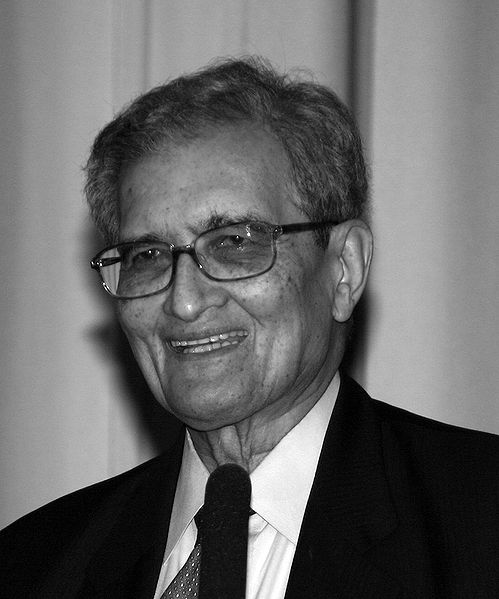Amartya Sen

Amartya Kumar Sen CH (Hon) (born 3 November 1933), is a Bengali Indian economist, philosopher, and a winner of the Nobel Memorial Prize in Economic Sciences in 1998, “for his contributions to welfare economics” for his work on famine, human development theory, welfare economics, the underlying mechanisms of poverty, and political liberalism.
Research
Sen’s papers in the late 1960s and early 1970s helped develop the theory of social choice, which first came to prominence in the work by the American economist Kenneth Arrow, who famously proved that all voting rules, be they majority rule or two thirds-majority or status quo, must inevitably conflict with some basic democratic norm. Sen’s contribution to the literature was to show under what conditions Arrow’s Impossibility Theorem would indeed come to pass as well as to extend and enrich the theory of social choice, informed by his interests in history of economic thought and philosophy.
Work on Development Economics
Sen’s work in the field of development economics has had considerable influence in the formulation of the Human Development Report, published by the United Nations Development Programme. This annual publication that ranks countries on a variety of economic and social indicators owes much to the contributions by Sen among other social choice theorists in the area of economic measurement of poverty and inequality.
Sen’s revolutionary contribution to development economics and social indicators is the concept of ‘capability’ developed in his article “Equality of What.” He argues that governments should be measured against the concrete capabilities of their citizens. This is because top-down development will always trump human rights as long as the definition of terms remains in doubt (is a ‘right’ something that must be provided or something that simply cannot be taken away). For instance, in the United States citizens have a hypothetical “right” to vote. To Sen, this concept is fairly empty. In order for citizens to have a capacity to vote, they first must have “functionings.” These “functionings” can range from the very broad, such as the availability of education, to the very specific, such as transportation to the polls. Only when such barriers are removed can the citizen truly be said to act out of personal choice. It is up to the individual society to make the list of minimum capabilities guaranteed by that society. For an example of the “capabilities approach” in practice, see Martha Nussbaum’s Women and Human Development.
Work on Gender
Among his many contributions to development economics, Sen has produced work on gender inequality. He wrote a controversial article in the New York Review of Books entitled “Missing Women“, analyzing the mortality impact of unequal rights between the genders in the developing world, particularly Asia. Other studies, such as one by Emily Oster, have argued that this is an overestimation, though Oster has recanted some of her conclusions.
Sen was seen as a ground-breaker among late twentieth-century economists for his insistence on discussing issues seen as marginal by most economists. He mounted one of the few major challenges to the economic model that posited self-interest as the prime motivating factor of human activity. While his line of thinking remains peripheral, there is no question that his work helped to re-prioritize a significant sector of economists and development workers, even the policies of the United Nations.
References
- http://en.wikipedia.org/wiki/Amartya_Sen
See Also
- Missing Women


